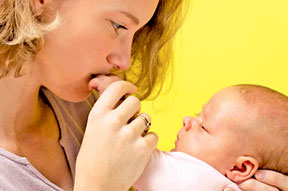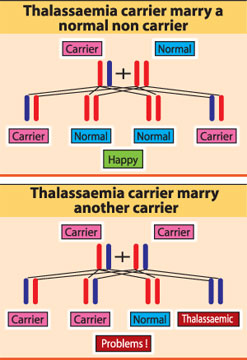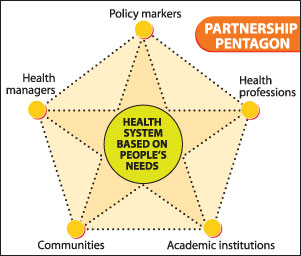|
HealthWatch |
compiled and coordinated by Edward
ARAMBEWALA |
Having a healthy baby
Advice for those getting married this year:
Consultant paediatrician Base Hospital, Mawanella Dr. R.M. Mudiyanse
(MBBS, DCH, MD, MRCP) gives the following advice for those getting
married this year in having healthy babies.
 Having
a healthy baby is the dream of any married couple. The nature has taken
all the necessary precautions to prevent a birth of abnormal babies. The
chance of having a healthy baby is very high as much as 95%. But there
are unfortunate stories where babies are born with various types of
birth anomalies. How can we minimise this chance? Having
a healthy baby is the dream of any married couple. The nature has taken
all the necessary precautions to prevent a birth of abnormal babies. The
chance of having a healthy baby is very high as much as 95%. But there
are unfortunate stories where babies are born with various types of
birth anomalies. How can we minimise this chance?
The causes for birth anomalies have been recognised birth defects
could be prevented. Many of these preventive measures could be carried
out at personal level.
* Marry when you are between 20 and 30 years of age
* Avoid marrying a close relative
* Check blood for thalassaemia carrier state when teenagers
* Get vaccinated against rubella when you are young
* Plan your conception
* Start taking folic acid vitamin before the conception
* Avoid drugs, chemicals, and x-rays
* Make sure young girls are getting an adequate diet
* Avoid pets, or make sure that you pets are not harbouring
toxoplasmosis a disease that can cause birth defect in your baby
Why marry when you are between 25 and 35 years
 Epidemiological
studies have shown that the optimum age for marriage is between 20 and
30 years. Babies born during this period have the best chance survival
and being healthy. Epidemiological
studies have shown that the optimum age for marriage is between 20 and
30 years. Babies born during this period have the best chance survival
and being healthy.
Mothers of younger age tend to have smaller babies and the chances of
those bobbies to have complications in early neonatal period are very
high. Teenage mothers are still growing. During this period their
systems in the body is diverting its functions and energy for growth.
Additional demand of growing a baby will be a challenge. Similarly
mothers above 35 have a higher chance to deliver bobbies with congenital
anomalies. The best example for this is Downs Syndrome well-known as
Mongolism.
Mothers above 35 have 1-2 per cent chance of having Down Syndrome
while the mothers below 25 have only 0.1 per cent chance of having down
baby. There are many other similar diseases that can have higher
incidence with age of the mother.
The advice is that it is better to marry during this age group
because the chances for having a healthy baby and successful pregnancy
outcome are high. Don’t delay the marriage unnecessarily. Postpone
having children until about 20 years of age even if you are married.
Avoid marrying a close relative
Genes that are embedded in the 23 pairs of chromosomes of our cells,
control almost all the functions in the body directly or indirectly.
These chromosomes are very important. They come in pairs (duplicates),
one from mother and the other from father.
This happens at the time of conception; when a sperm from the father
joins with the ovum of the mother. This important event takes place 14
days prior to the first miss period of a mother in pregnancy. This means
two weeks before they knew that they are pregnant.
Babies can inherits a bad gene from one of the parent, and still
avoid malfunction of the body because genes provided by the other parent
could compensate for it. This system of compensating by one of the
parent works most of the time to minimize inherited diseases.
However this will break down when both parents are having defective
gene for the particular function. The chances of this happening are high
when both mother and father are relatives. Closer relatives have even a
higher chance of bad genes for the same function.
Therefore it is better to avoid marriages between close relatives
because both of them have a higher chance of having an affected baby
than a randomly met couple. Thalassaemia, blindness, deafness, and
cardiac malformations are few out of many examples that can be given.
This type of genes that can be compensated by having one gene is
called Autosomal recessive genes. Whereas other type of genes that will
cause disease even if it is inherited from one of the parents is called
Autosomal dominant genes.
There are some genes that are bound with X Chromosome called X linked
genes or sex linked genes. Males are having only one X chromosome.
Therefore if the problem is related to the X chromosome boys will get
the disease unless the mother provides them with a good X chromosome.
Prevention of thalassaemia
In Sri Lanka about 60 bobbies are born with thalassaemia every year.
This disease leads to premature destruction of red cells in our blood.
Treatment available is palliative and expensive.
A child with thalassaemia will have to have blood transfusions every
month for lifetime while taking injections to remove excess iron that is
accumulating in the body daily everyday.
Lifetime cost is about 10-20 million rupees. Therefore prevention is
the best/only option for this illness. Prevention of this illness is
possible.
This can be achieved by adopting simple principals of genetics. Both
parents have to be careers to give a birth to a child with Thalassaemia.
Both the parents of all thalassaemia patients in our country are
thalassaemia carriers. If one of them was not a thalassaemia carrier,
baby wouldn’t have got thalassaemia.
When the mothers are checked at antenatal clinics so many of them are
thalassaemia carriers, but all of them have healthy babies if the
husband is not a thalassaemia carrier. Thalassaemia carriers will
produce babies with thalassaemia only if they marry another carrier.
Just three nights of bad sleep raises diabetes risk: Study
Just three nights of bad sleep is enough to dramatically reduce the
body’s ability to process glucose and raise the risk of diabetes, a
study released Monday found.
 Suppressing
deep sleep for three nights in a row decreased the glucose tolerance of
young, healthy adults as much as if they had gained eight to 13 kilos
(20 to 30 pounds), researchers at the University of Chicago’s medical
school found. Suppressing
deep sleep for three nights in a row decreased the glucose tolerance of
young, healthy adults as much as if they had gained eight to 13 kilos
(20 to 30 pounds), researchers at the University of Chicago’s medical
school found.
And while it is possible that the body’s ability to process glucose
would adjust to chronic sleep deprivation, it is likely that poor sleep
patterns in the elderly and obese play a role in the development of
diabetes, the authors concluded.
Deep sleep, or “slow wave sleep,” is considered the most restorative
form of sleep and has been shown to be important for mental clarity.
This is the first study to show its significance for physical
well-being.
“Previous studies from our lab have demonstrated many connections
between chronic, partial, sleep deprivation, changes in appetite,
metabolic abnormalities, obesity, and diabetes risk,” said study author
Eve Van Cauter.
“These results solidify those links and add a new wrinkle, the role
of poor sleep quality, which is also associated with aging.”
Nine lean, healthy volunteers between the ages of 20 and 31 spent
five nights in a sleep laboratory where they went to bed at 11 pm and
got out of bed at 7:30 am.
They were undisturbed for the first two nights but on the following
three nights, speakers near the bed emitted low-level sounds whenever
their brain patterns indicated they were drifting into deep sleep.
While not loud enough to wake them, the sounds reduced deep sleep by
about 90 percent by shifting them out of the onset of deep sleep back
into a lighter sleep.
This mimicked typical sleeping patterns of those over the age of 60
who generally get only 20 minutes of deep sleep a night compared with 80
to 100 minutes for young adults.
When tested after having had their sleep disturbed, the insulin
sensitivity of the volunteers had decreased by 25 percent, which meant
they needed more insulin to dispose of the same amount of glucose.
But insulin secretion did not go up in eight of the subjects and, as
a result, they showed a 23 percent increase in blood glucose levels.
“Since reduced amounts of deep sleep are typical of aging and of
common obesity-related sleep disorders ... these results suggest that
strategies to improve sleep quality, as well as quantity, may help to
prevent or delay the onset of type 2 diabetes in populations at risk,”
Van Cauter added.
The study will be published Wednesday in the Proceedings of the
National Academy of Sciences. AFP
Happy and a peaceful New Year for all from the SLMA
Sri Lanka Medical Association Headed by Prof. Lalitha Mendis wishes a
Happy Peaceful and a Healty New Year for all in Sri Lanka.
The newly elected Councils of the Association comprise - President -
Prof. Lalitha Mendis, President Elect - Prof. Rezvi Sheriff, Vice
President - Dr. Udaya Ranawaka, Dr. Ananda Wijewickrema, Secretary - Dr.
Indika Karunatilleke, Assistant Secretaries - Drs. Priyadarshani
Galappatthy, M.R. Haniffa, Pubudu de Silva, Treasurer - Dr. Gamini
Walgampaya, Assistant Treasurer - Dr. Rohan Chinniah.
Sri Lanka Medical Association Council 2008
At the annual general meeting of the Sri Lanka Medical Association
held on the 15th of December 2007, the following members were elected to
the Council for the year 2008.
Council members - Dr. Sunil Seneviratne Epa (Southern province), Dr.
G.C.D. Abeywickrama (Central Province), Dr. N. Jeyakuamran (North
Province), Dr. Eshanth Perera (North Central Province), Dr.
Suriyakanthie Amarasekera, Dr. Dennis Aloysius, Dr. Vajira H.W.
Dissanayake, Dr. Malik Fernando, Prof. Colvin Goonaratna, Dr. N.
Ganeshanathan, Dr. M.M. Ismail, Dr. Lucian Jayasuriya, Dr. P.G. Mahipala,
Dr. R.W.T.W.A.M. Olupeliyawa, Dr. Anuruddha Padeniya, Dr. K. Sri Ranjan,
Dr. S. Sivapriyan, Dr. D.W. Weerasooriya, Dr. M.C. Weerasinghe, Dr. K.
Wickramasinghe, Public Relations Officer - Dr. Nalinda Andraweera,
Social Secretaries - Dr. Thiwanka Wijeratne, Dr. Preethi
Wijegoonewardene, Past President’s representative - Dr. Lakshman
Ranasinghe, Ex-officio members of the Council - Prof. Gita Fernando
(Immediate Past President), Dr. Chandanie Wanigatunge (Outgoing
Secretary), Dr. Anuruddha Abeygunasekera (Co-Editor CMJ), Prof. Janaka
de Silva (Co-Editor CMJ).
Five Star Doctors
 Doctors
play the major role in building up a healthy society. To carry out this
work properly they have to follow five principles and work accordingly
thus becoming “Five Star Doctors”. Doctors
play the major role in building up a healthy society. To carry out this
work properly they have to follow five principles and work accordingly
thus becoming “Five Star Doctors”.
Dr. W.A. Fedrinand writing in the IMPA (Independent Medical
Practitioners Association) news bulletin Vol. II on this topic under
profile of a “Five Star” Doctor describe these Five Stars (Principles)
as follows:
The Profile -
The “Five Star” Doctor has the desirable profile for a healthcare
professional in a system that is based on responding to people’s needs.
The Five Star Doctor role includes.
1. Care provider who considers the patient holistically as an
individual and as an integral part of a family and the community, and
provides high quality, comprehensive, continuous and personalised care
within a long-term trusting relationship.
2. Decision maker who makes scientifically sound judgements about
investigations, treatments and use of technologies that take into
account the patient’s wishes, ethical values, cost effective
considerations and the best possible care for the patient.
3. Communicator, who is able to promote healthy lifestyles by
effective explanation and advocacy thereby empowering individuals and
groups to enhance and protect their health.
4. Community leader, who having won the trust of the people among
whom he or she works, can reconcile individual and community health
requirements, advise citizens groups and initiate action on behalf of
the community.
5. Manager, who can work harmoniously with individuals and
organisations both within and outside the health system to meet the
needs of individual patients and communities, making appropriate use of
available health data.
Partnership pentagon
This partnership pentagon if progressively strengthened and activated
can effectively motivate our doctors to try and achieve the “Five Star”
status. This will ensure the health and the wealth of the nation.
Wisdom of drinking black tea
Dr. D.P. ATUKORALE
There is scientific evidence
(a) that black tea reduces that risk of heart attacks and stroke;
(b) that drinking black tea helps to control blood pressure;
(c) that drinking black tea protects against a range of cancers;
(d) that black tea helps to prevent cavities, gum disease and
halitosis;
(e) that drinking black tea prevents diabetes;
(f) that drinking black tea boosts immune system and mental
alertness;
(g) that black tea soothes away stress;
(h) that black tea helps to stop excess iron, damaging the body in
iron overload disorders.
Effect of Milk On Tea
According to Lorenz et al who did a research project at University of
Berlin in Mitte, it has been shown that adding milk to tea will block
all the above healthful effects of tea, as casein from milk binds to
molecules of tea that cause arteries to relax especially E.G.C.G. Adding
milk to tea also blocks tea’s effect on other things such as prevention
of cancer.
It is noteworthy that plant-based milks such as soy milk do not
contain casein and is quite nutritious and does not cause any allergies.
Laughter is the best medicine
The best doctor in the world is veterinarian.
He never asks his patients, “what’s wrong?”
Sent by: H.M. Gunatilake, Hospital Secretary, Base Hospital, Marawila
|

